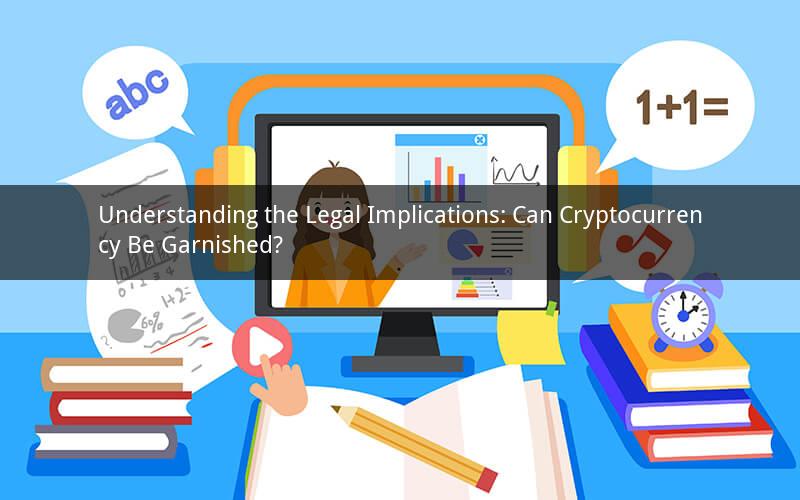
In the rapidly evolving digital landscape, cryptocurrencies have gained significant traction. As a form of digital asset, cryptocurrency has raised several legal questions, with one of the most pressing being whether it can be garnished. This article delves into the intricacies surrounding this issue, providing a comprehensive overview of the legal implications of garnishing cryptocurrency.
Can cryptocurrency be garnished? The answer is nuanced and depends on various factors. In this article, we will explore the legal frameworks that govern cryptocurrency garnishment, discuss the challenges involved, and analyze case studies to shed light on the current landscape.
1. Understanding Garnishment
Garnishment is a legal process used to seize a debtor's property or earnings to satisfy a debt. It is commonly employed in situations where the debtor is unable to pay the debt voluntarily. In the context of cryptocurrency, garnishment would involve seizing digital assets held in a cryptocurrency wallet or exchange.
1.1 Legal Framework
The legal framework governing garnishment varies from country to country. In some jurisdictions, garnishment is strictly regulated, while in others, it is more flexible. The key aspect is that garnishment must be authorized by a court order, which is typically obtained in response to a civil lawsuit.
1.2 Cryptocurrency and Garnishment
Cryptocurrency presents unique challenges when it comes to garnishment. Unlike traditional assets like bank accounts or real estate, cryptocurrency is decentralized and operates on a global scale. This decentralized nature makes it difficult to trace and seize cryptocurrency assets.
2. Challenges in Cryptocurrency Garnishment
2.1 Anonymity
One of the primary challenges in garnishing cryptocurrency is the anonymity it offers. Cryptocurrency transactions are recorded on a public ledger called the blockchain, but the identities of the parties involved are not always disclosed. This anonymity makes it challenging to identify the debtor's cryptocurrency assets.
2.2 Decentralization
Another significant challenge is the decentralized nature of cryptocurrency. Unlike traditional assets that can be easily frozen or seized, cryptocurrency transactions can be executed without a central authority's intervention. This makes it difficult for creditors to track and seize cryptocurrency assets.
2.3 Legal Hurdles
In some jurisdictions, the legal framework governing cryptocurrency is still evolving. This can create hurdles in obtaining a court order for garnishing cryptocurrency assets. Additionally, courts may be hesitant to issue such orders due to the novelty and complexity of the issue.
3. Case Studies
Several high-profile cases have highlighted the challenges and complexities of cryptocurrency garnishment. One notable case involves the seizure of Bitcoin in the United States, where a court ordered the freezing of cryptocurrency assets to satisfy a judgment against the debtor.
Another example is the case of Mt. Gox, a cryptocurrency exchange that filed for bankruptcy. The bankruptcy trustee attempted to liquidate the exchange's assets, including cryptocurrency, but faced numerous challenges due to the decentralized nature of the assets.
4. Future Outlook
As cryptocurrency continues to gain widespread adoption, the legal implications of garnishing cryptocurrency assets are likely to evolve. Several factors, such as technological advancements, regulatory developments, and increased legal precedents, will shape the future of cryptocurrency garnishment.
4.1 Technological Solutions
Blockchain technology and advancements in digital forensics may offer solutions to the challenges of cryptocurrency garnishment. For instance, blockchain analysis tools can help trace cryptocurrency transactions and identify the debtor's assets.
4.2 Regulatory Developments
Governments and regulatory bodies are increasingly recognizing the need for regulations to address the legal complexities of cryptocurrency. As these regulations take shape, they may provide clearer guidelines for garnishing cryptocurrency assets.
4.3 Legal Precedents
Establishing legal precedents through court decisions will play a crucial role in shaping the future of cryptocurrency garnishment. As more cases are litigated, courts will set precedents that can guide future decisions regarding the seizure of cryptocurrency assets.
5. Frequently Asked Questions
Q1: Can cryptocurrency be garnished in all jurisdictions?
A1: No, the legal framework governing cryptocurrency garnishment varies from country to country. It is essential to consult with a legal expert to understand the specific regulations in your jurisdiction.
Q2: What are the challenges in tracing cryptocurrency assets?
A2: The anonymity and decentralized nature of cryptocurrency make it challenging to trace assets. Blockchain analysis tools and digital forensics may be employed to overcome these challenges.
Q3: Can garnishment be avoided if the debtor moves to a different country?
A3: Garnishment can be complicated if the debtor moves to a different country. It is crucial to seek legal advice to understand the cross-border implications of cryptocurrency garnishment.
Q4: Are there any alternatives to garnishing cryptocurrency assets?
A4: Yes, alternatives to garnishment, such as settlements or negotiation, may be pursued. It is essential to explore all possible options with a legal expert.
Q5: How can individuals protect their cryptocurrency assets from garnishment?
A5: Individuals can protect their cryptocurrency assets by maintaining privacy, employing secure wallets, and seeking legal advice to understand the risks and legal implications of garnishing cryptocurrency.
In conclusion, the question of whether cryptocurrency can be garnished is a complex issue with various legal implications. The decentralized and anonymous nature of cryptocurrency presents unique challenges in the garnishment process. As the legal landscape continues to evolve, it is crucial to stay informed about the latest developments and consult with legal experts to navigate the complexities of cryptocurrency garnishment.